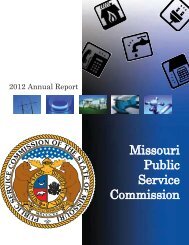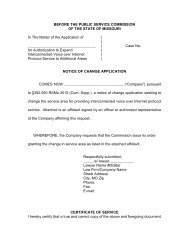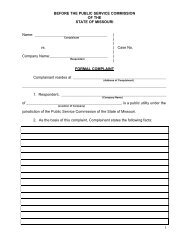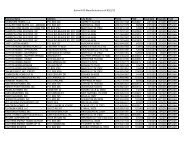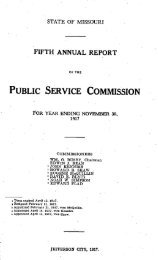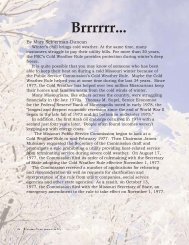1993 PSC Annual Report - Missouri Public Service Commission
1993 PSC Annual Report - Missouri Public Service Commission
1993 PSC Annual Report - Missouri Public Service Commission
Create successful ePaper yourself
Turn your PDF publications into a flip-book with our unique Google optimized e-Paper software.
State Regulatory Summary<br />
13<br />
approved by the <strong>Commission</strong> was presented by<br />
the <strong>PSC</strong> Staff, the Office of the <strong>Public</strong> Counsel<br />
and Southwestern Bell Telephone Company.<br />
An extension to the plan was granted in order<br />
to give the <strong>Commission</strong> and other parties<br />
sufficient time and flexibility to give fun<br />
consideration to proposals ftled on October 1,<br />
1992, regarding any future alternative regulation<br />
plan. In addition, the <strong>Commission</strong> will<br />
detennine whether the current revenues of<br />
Southwestern Bell Telephone Company should<br />
be reduced as proposed by the <strong>PSC</strong> Staff in a<br />
complaint case flled on February 1, <strong>1993</strong>. A<br />
proposal ftled by Southwestern Bell also<br />
contains a revenue reduction.<br />
The <strong>Commission</strong> must also rule on a proposal<br />
ftled by Southwestern Bell incorporating a fiber<br />
optic modernization program called TeleFuture<br />
2. These issues were to be decided by the<br />
<strong>Commission</strong> in December <strong>1993</strong>.<br />
Southwestern Bell is currently under an<br />
experimental incentive regulation plan which<br />
calls for customers to share in earnings<br />
achieved above a specified return on equity.<br />
The plan also required Southwestern Bell to<br />
upgrade its network through the replacement of<br />
36 electromechanical switches and the conversion<br />
of more than 7,000 multiparty lines to<br />
single party service during fiscal year 1992.<br />
CallerID<br />
Soulhwestern Bell Telephone Company<br />
became the ftrst local exchange telephone<br />
company in <strong>Missouri</strong> to offer Caller ID under a<br />
decision issued on March 18, <strong>1993</strong>.<br />
<strong>Missouri</strong> joined 39 olher states plus the<br />
District ofColumbia which have some fonn of<br />
Caller ID.<br />
Caller ID delivers to the subscriber the<br />
telephone number of lhe calling party. Subscribers<br />
to this service provide lheir own<br />
compatible equipment to display the calling<br />
party's telephone number.<br />
As part ofCaller ID, Southwestern Bell will<br />
provide free pet call blocking to all customers<br />
and will also offer free per line blocking on a<br />
very limited basis.<br />
Relay <strong>Missouri</strong><br />
In 1990, the <strong>Missouri</strong> General Assembly<br />
passed legislation directing the <strong>Missouri</strong> <strong>Public</strong><br />
<strong>Service</strong> <strong>Commission</strong> to develop a statewide<br />
dual-party relay system enabling the deaf, hard<br />
of hearing and speech impaired to communicate<br />
by telephone through a third party called a<br />
communications assistant.<br />
Relay <strong>Missouri</strong>, which began in June of 1991,<br />
ended its second year of operation in June of<br />
<strong>1993</strong>. The Relay <strong>Missouri</strong> program continues to<br />
grow. In its fIrst year of operation, usage totaled<br />
84,418 minutes. By the end ofJune <strong>1993</strong>, that<br />
grew to approximately 2.8 million minutes of<br />
usage. Relay <strong>Missouri</strong> processes approximately<br />
647,000 calls a month and employs 188 communications<br />
assistants.<br />
Relay <strong>Missouri</strong> service operations are supported<br />
through a surcharge on telephone access<br />
lines in <strong>Missouri</strong>.<br />
Natural Gas-Electric<br />
Rules For Future Electric Planning<br />
In December 1992, the <strong>Missouri</strong> <strong>Public</strong><br />
<strong>Service</strong> <strong>Commission</strong> issued final rules which<br />
require electric companies in <strong>Missouri</strong> to<br />
develop plans examining the most efficient and<br />
cost-effective way to provide electric service in<br />
the future. These rules will, for the first time,<br />
require utilities to evaluate conservation and<br />
energy efficiency as an alternative to the<br />
construction of additional power supply facilities.<br />
These rules require the five largest electric<br />
companies (Union Electric, Kansas City Power<br />
& Light, <strong>Missouri</strong> <strong>Public</strong> <strong>Service</strong>, Empire<br />
District Electric and St Joseph Light & Power)<br />
to file resource plans covering the next 20 years.<br />
These companies will make initial filings on a<br />
staggered basis over the next three years.<br />
Updated plans will be filed on a three year cycle.



